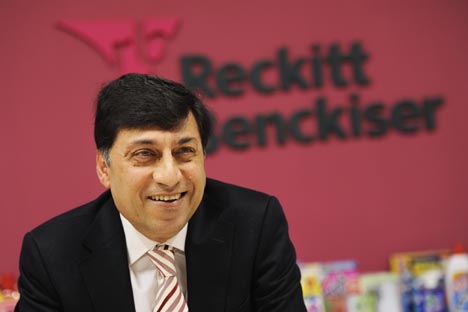The most difficult thing in Russia is to be liked by the consumer – Reckitt Benckiser CEO

Rakesh Kapoor: the Chief Executive Officer of Reckitt Benckiser. Source: Gregory Sobchenko_BFM.ru
Rakesh Kapoor, the Chief Executive Officer of Reckitt Benckiser plc, has been working with the British multinational consumer goods company for about 25 years. The $40 billion company chooses not to advertise the Reckitt Benckiser brand, but focuses on building brand equity for its wide offering of products such as Dosia, Durex, Nurofen and Vanish.
Vedomosti: Everyone in Russia knows the Vanish, Durex, and Dosia brands, but few people know they are all produced by a single company. And hardly anyone knows the company’s name, unlike, for example, Johnson & Johnson. Why did you choose this strategy?
This is an old dilemma: should one promote an individual brand, a single umbrella brand or the manufacturer? There is no right answer. We put out various products and we want every brand to match its target audience. The consumer does not care who the manufacturer is. We promote the Reckitt Benckiser corporate brand in ten markets (including Russia) only among students and graduates – in order to attract new employees.
How does the Russian market differ from other emerging markets?
We are a fairly big player in Russia. We have increased our stake in Medkom MP from 70 to 100%. The deal was officially completed on June 6, 2012 but we are not disclosing the cost. We are also big in other BRIC countries. If one compares these markets, Russian consumers are more demanding and are eager to try anything new. When you launch a new product, it is more likely to be bought on a trial basis in Russia than in other countries. But it will have a harder time getting the customer’s approval.
What is the share of the Russian market in the company’s sales?
We do not disclose shares in individual countries. But I can say that Russia is an important market for our company, a key one that is extremely important for our future success.
At what rate are your Russian sales growing?
If you look at the last five or even ten years, Reckitt Benckiser sales in Russia have shown some of the fastest growth rates in the world. All I can tell you is that we have fantastic growth in Russia and I am sure that, in the future, your country will be an important area for our company.
What other markets are going to be equally important?
Brazil, India. Our business in China so far is not large.
Why?
In India, we have worked for more than 60 years and we have worked for quite a long time in Brazil too, but we have been in China only since the early 1990s. This is still a new market for us.
But Reckitt Benckiser came to Russia earlier.
Yes, Benckiser has worked here since 1994.
What, then, is wrong with China?
We have a smaller chain of brands and no medical products…
Is the problem one of entering the market, local bureaucracy or something else?
I think it’s mainly the problem of breaking in to the market. But, of the four BRIC countries, we are highly successful in three. It happens, you know, you have more success in some places than in others. But I can tell you that our business in China doubled after we acquired the contraceptives business of SSL International Plc in 2010.
Perhaps you could disclose the rates of sales growth on all the developing markets?
Sales in the emerging markets increased by 11 percent last year. In the first quarter of this year, sales grew by 11 percent in the LAPAC region (Latin America – Asia Pacific), by 9 percent in RUMEA (Russia, Middle East, Africa). They were down 1 percent in Europe and North America, according to Vedomosti.
What is Reckitt Benckiser’s preferred strategy: to develop new products itself or buy them? Vanish, Durex, Mucinex, Woolite, Nurofen and Strepsils – you bought all these goods along with the manufacturing companies and did not invent them.
You are absolutely right. But we have developed a whole range of other products: such brands as Cillit Bang, Calgon, Gaviscon, Harpic, Lysol, Finish, Mortein, Air Wick, Disprin, Dettol and many others. The company is not wedded to just one method. If we invent something ourselves, fine; if we have a chance to buy a good product, why not do so?
In what areas are the most interesting companies in terms of M&A?
RK: First of all, our strategy is focused on health, hygiene and domestic goods. We are interested only in the companies that work in these three areas. Second, we do not have the necessary distributor base on some markets. For example, in April 2011, we acquired the Indian company Paras Pharmaceuticals Ltd, which specialises in health goods. That opened up new opportunities on the local market. Likewise, if we are interested in a local health goods manufacturer in China or even in Brazil, we will consider that option. Third, if we find powerful new brands on a global scale, such as Durex, we will again be interested.
What interests Reckitt Benckiser in Russia?
RK: We have a very strong presence here. But if an interesting option turns up, we will consider it.
Reckitt Benckiser’s top management have been saying for years that the company does not rule out building another plant in addition to the production facility in Klin. When will this happen?
RK: We have expanded our production capacity in Klin over the last five years and we are going to expand it further. But we won’t disclose our exact plans.
This article has been abridged from the original text. It can be read in Russian in Vedomosti.ru.
All rights reserved by Rossiyskaya Gazeta.
Subscribe
to our newsletter!
Get the week's best stories straight to your inbox